

Doubts About MOOCs Continue to Rise. Academic leaders increasingly think that massive open online courses are not sustainable for the institutions that offer them and will "cause confusion about higher-education degrees," according to the results of an annual survey.
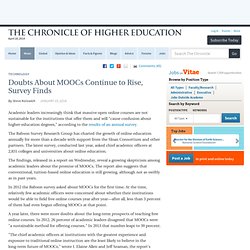
The Babson Survey Research Group has charted the growth of online education annually for more than a decade with support from the Sloan Consortium and other partners. The latest survey, conducted last year, asked chief academic officers at 2,831 colleges and universities about online education. The findings, released in a report on Wednesday, reveal a growing skepticism among academic leaders about the promise of MOOCs. The report also suggests that conventional, tuition-based online education is still growing, although not as swiftly as in past years. In 2012 the Babson survey asked about MOOCs for the first time. Coursera.org. Low-Cost MOOC To Grant 3 Credits at Tiffin U.
MOOCs | News Low-Cost MOOC To Grant 3 Credits at Tiffin U.
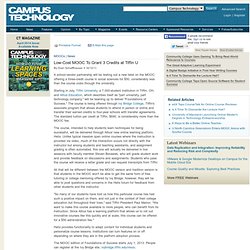
We're All to Blame for MOOCs - The Chronicle Review. Why MOOCs Are Hindering and Not Helping Higher Ed. Open online courses – an avalanche that might just get stopped. These days there are plenty of prophets preaching hi-tech and digital solutions to the problems of expanding access to knowledge and higher education.
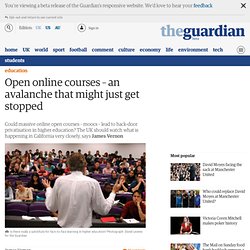
Major Players in the MOOC Universe - The Digital Campus 2013. How EdX Plans to Earn, and Share, Revenue From Free Online Courses - Technology. By Steve Kolowich How can a nonprofit organization that gives away courses bring in enough revenue to at least cover its costs?
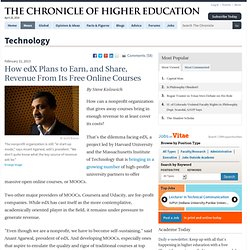
That's the dilemma facing edX, a project led by Harvard University and the Massachusetts Institute of Technology that is bringing in a growing number of high-profile university partners to offer massive open online courses, or MOOCs. Two other major providers of MOOCs, Coursera and Udacity, are for-profit companies. While edX has cast itself as the more contemplative, academically oriented player in the field, it remains under pressure to generate revenue. How Can MOOC Platforms Be More Dynamic?: A Comparison of Major MOOC Providers. This past winter, like many prospective students, I browsed through hundreds of college course descriptions to find subjects right for me.
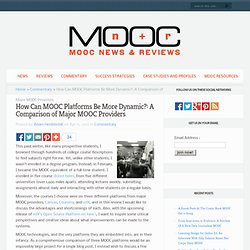
Yet, unlike other students, I wasn’t enrolled in a degree program. Instead, in February, I became the MOOC equivalent of a full-time student. I enrolled in five course (listed here), from five different universities (over 1,600 miles apart), attending lectures weekly, submitting assignments almost daily and interacting with other students on a regular basis. Videos connectivism. The Past, Present, And Future Of MOOCs. New MOOC Provider Says It Fosters Peer Interaction - Wired Campus. Mooc platform to focus on group learning. A different kind of massive open online course (Mooc) platform, launched today, will provide students with the small collaborative learning groups that have so far been hard to find in the Mooc format.
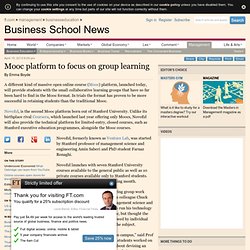
In trials the format has proven to be more successful in retaining students than the traditional Mooc. NovoEd, is the second Mooc platform born out of Stanford University. Unlike its birthplace rival Coursera, which launched last year offering only Moocs, NovoEd will also provide the technical platform for limited-entry, closed courses, such as Stanford executive education programmes, alongside the Mooc courses.
NovoEd, formerly known as Venture Lab, was started by Stanford professor of management science and engineering Amin Saberi and PhD student Farnaz Ronaghi. NovoEd launches with seven Stanford University courses available to the general public as well as 10 private courses available only to Stanford students. Moocnewsandreviews.com - Will MOOC Technology Break the Education Cartel? Jonathan Nadler Part 1. The obligatory history lesson: It happened to the record industry first. While popular music had long been available on radio, it could be argued that a true music industry as we know it today didn’t arise until the 50‘s and 60‘s when distributable media and players became widely available.
With ePortfolio Evidence. C-Level View | Feature The Taming of the MOOC--With ePortfolio Evidence By Trent Batson01/16/13 The IT revolution that was supposed to transform higher education has failed to materialize, at least in the way we had imagined it.
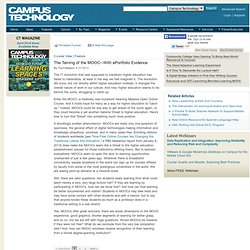
The revolution did occur, but not directly within higher education--instead, it changed the overall nature of work in our culture. And now, higher education seems to be behind the curve, struggling to catch up. AAEEBL - Home for the World ePortfolio Community. #ETMOOC. Bb Open Courses. CourseSites Open Course Series : Instructor Home Page. Course: ECP2012OpenCourse: Designing an Exemplary Course. CourseSites by Blackboard.

Contrarians. The Ed Techie. [The following is an adapted extract from the upcoming Battle for Open book, which I'm bouncing off you lot first].
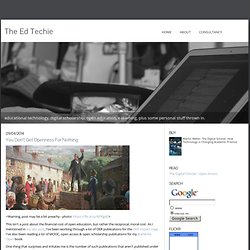
I am not by nature an overtly political person, in that I don't interpret everything through a political lens. So, rather like Clay Shirky and higher ed, writing on politics is not my strongest point. Which is by way of saying, sorry of what follows is a bit rubbish. Open online courses – an avalanche that might just get stopped. Categories. The Realities of MOOCs. Two weeks ago we launched a Massive Open Online Course (MOOC) in association with the University of San Diego (USD).
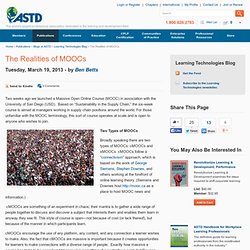
Based on “Sustainability in the Supply Chain,” the six-week course is aimed at managers working in supply chain positions around the world. For those unfamiliar with the MOOC terminology, this sort of course operates at scale and is open to anyone who wishes to join. Two Types of MOOCs Broadly speaking there are two types of MOOCs: cMOOCs and xMOOCs. cMOOCs follow a “connectivism” approach, which is based on the work of George Siemens, Stephen Downes, and others working at the forefront of online learning theory. (Siemens and Downes host as a place to host MOOC news and information.) cMOOCs are something of an experiment in chaos; their mantra is to gather a wide range of people together to discuss and discover a subject that interests them and enables them learn in anyway they see fit.
The Mechanical MOOC. Cross-posted at Inside Higher Ed MIT OpenCourseware, OpenStudy, Peer to Peer University, and Codecademy are teaming up to launch a “Mechanical MOOC” – a free and open introductory course in the programming language Python that weaves together existing resources (content, Web-based study groups, quizzes and so on). Unlike some of the other MOOCs that have launched in recent months – particularly those headline-grabbing efforts from Stanford (and Coursera and Udacity) – this “Mechanical MOOC” will not force learners into a centralized website that recreates the LMS experience, where all the official lessons, lectures, discussions and assignments are supposed to take place. Instead, the content for this MOOC is linked from the original sources and distributed via an email list managed by P2PU.
‘Mechanical MOOC’ to Rely on Free Learning Sites. Donald Clark Plan B.